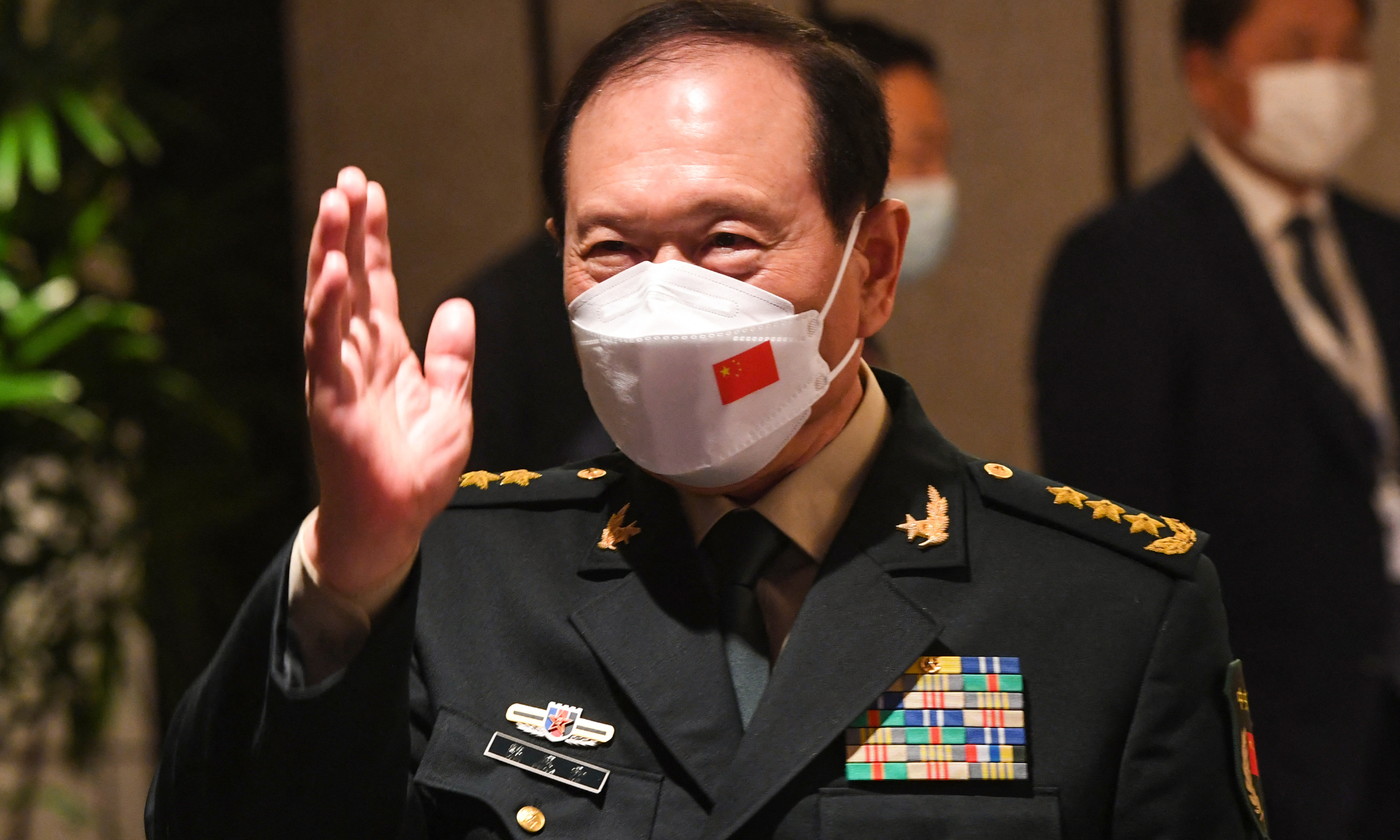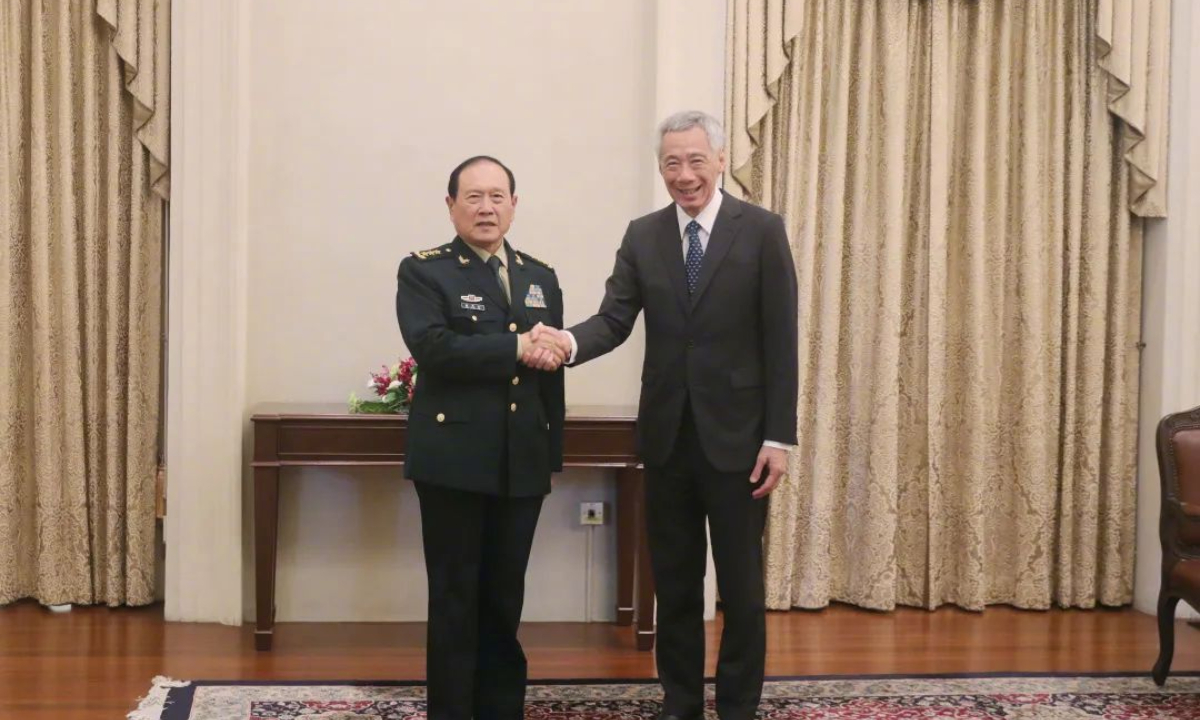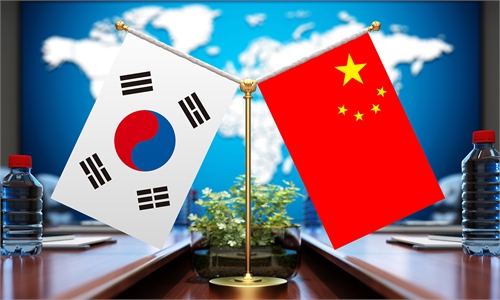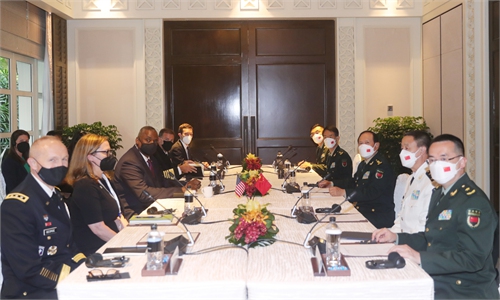China engages US and regional countries at Shangri-La dialogue ‘with confidence, determination to safeguard sovereignty, national interest, regional peace’

China's State Councilor and Defense Minister Wei Fenghe gestures during the ministerial roundtable luncheon at the Shangri-La Dialogue summit in Singapore on June 11, 2022. Photo:AFP
The Chinese military delegation engaged in a series of dialogue and meetings with the US and other Asian countries including South Korea and Singapore, as well as the leader of Singapore, during the ongoing Shangri-La Dialogue, which successfully made clear China's stance on safeguarding regional peace and its determination to defend itself against all offensive attempts that could harm China's sovereignty and national interests.
But the problematic attitude of the US and Japan are also clear - to push military confrontation in the region to contain China under the pretext of "safeguarding regional peace." The US and Japan will never get what they want as China will keep improving ties with all peace-loving countries in the region, experts claimed on Saturday.
Deterring trouble-making forces
"The Chinese military won't hesitate to fight anyone who dares to separate the island of Taiwan from China," China's State Councilor and Defense Minister Wei Fenghe told US Defense Secretary Lloyd Austin during their first meeting in Singapore at the International Institute for Strategic Studies' (IISS) 19th Shangri-La Dialogue on Friday.
With the intention to use Taiwan island and topics related to the South China Sea to hype the "China threat" theory, the US seeks to build an iron curtain between China and other Asian countries and to implement its "Indo-Pacific Strategy" by rallying allies, analysts said, noting that China is drawing a bottom line by reiterating its firm stance on the Taiwan question.
Song Zhongping, a military expert and TV commentator, told the Global Times on Saturday that China and the US are making their points clearly to each other but there was no breakthrough in easing tensions.
"The problem is that the US' stance of 'opposing any unilateral changes to the status quo from either side' of Taiwan Straits is actually opposing the reunification of China, to keep the Chinese mainland and the island of Taiwan separated from each other, and this is what China will never accept," Song said.
The efforts that China has made to promote reunification, including strengthening military activities around the island and preparing to fight separatists and foreign forces, are actually the efforts for self-defense and safeguarding national sovereignty, Song said, noting that "this is why the Chinese defense chief stressed the People's Liberation Army (PLA) won't hesitate to fight. China must dominate the process of solving the Taiwan question."
Japan, as a US close ally who has ambition to seek more powerful military capability and the amendment of its Pacifist Constitution, is also trying to hype the China Threat theory at the Shangri-La Dialogue. Japanese Prime Minister Fumio Kishida said in his speech on Friday that in the East China Sea, "unilateral attempts to change the status quo by force in violation of international law are continuing. Japan is taking a firm stand against such attempts." And he also promoted the "five pillars of initiatives", with experts said these pillars and initiatives are all serving the real intention of making "Japan a military power that is able to fight."
At the request by the Chinese military delegation in the Shangri-La Dialogue, He Lei, former vice president of the Academy of Military Sciences of the People's Liberation Army, told the media when addressing Kishida's speech that "on the so-called issue of unilateral attempts to change the status quo by force in the East China Sea, it was Japan who firstly and illegally 'nationalize' the Diaoyu Islands and other relevant island around the region. This has broken the tacit understanding to lay aside disputes on the issue which shared by the leaders of China and Japan, and this has seriously harmed China's sovereignty."
China won't accept Japan's move to put the label of "changing the status quo by force" on China, He noted.
Chinese military analysts said Japan is the country which has sought to change the status quo and when it failed to stop China from safeguarding its sovereignty in the Diayu Islands, it starts pretending to be a victim and to accuse China, but if one day it successfully get rid of the limitation of the Pacifist Constitution, it would likely to transform the country in to a war machine again as it has never thoroughly review its war crimes toward other countries in the World War II and the long-existing militarism, and this is not only a threat to China, South Korea and other Asian countries, but also to the US, as Washington is actually the biggest obstacle for Tokyo to gain more military power.

Photo: Ministry of Defense
Working together with local partners
Apart from releasing warning and drawing redlines to the regional and non-regional forces who intended to interrupt the peace in the Asia-Pacific region, on Friday, the Chinese military delegation also engaged with regional countries including South Korea and Singapore to express China's sincerity in exchanges and making joint effort to safeguard regional peace together with the regional partners.
The Prime Minister of Singapore Lee Hsien Loong met with the visiting Chinese State Councilor and Defense Minister General Wei Fenghe at the Istana on the afternoon of June 10, 2022.
Prime Minister Lee Hsien Loong said the unique positioning of the all-round cooperative partnership progressing with the times between Singapore and China reflects the high level of the Singapore-China relationship. Both sides should continue to strengthen practical cooperation on anti-pandemic efforts, the economy and trade, and maintain the sound momentum of continuous development of bilateral ties.
He pointed out that at present, the international situation and the Asian-Pacific region are undergoing new changes, and Singapore hopes that all countries in this region can advance communication and enhance mutual trust, and jointly add more positive factors to regional peace and stability.
Wei said "In face of the changes unseen in a century and the global pandemic, China and Singapore should constantly deepen strategic mutual trust, expand the integration of common interests, strengthen mutual support on issues concerning each other's core interests and major concerns, so as to inject positive energy into regional peace and stability."
He also said that in recent years, the relationship of two militaries has seen stable development, and both sides should continue to enhance high-level exchanges and pragmatic cooperation, in a bid to push forward the military-to-military relations.
Chinese and South Korean defense ministers also exchanged views on Friday at the Shangri-La Dialogue in Singapore, which observers saw as an important and timely occasion for the two to engage in comprehensive communication to better understand each other and jointly work toward regional peace and security which is facing great challenges amid external interference.
Chinese State Councilor and Defense Minister Wei and South Korean Defense Minister Lee Jong-sup's meeting, the first since November 2019, came as tensions rise on the Korean Peninsula. Wei reiterated China's position of maintaining peace on the Korean Peninsula and hopes China and South Korea will cooperate on realizing the denuclearization of the peninsula.
Chinese analysts said the atmospheres of the meetings with South Korea and Singapore are much more friendly and productive. Most peace-loving countries in the region respect China's sovereignty and national interests, and they realized that regional actors and China are in a community with shared future, and even if there are disputes, they are willing to solve the problem via negotiations rather than be used by the US to serve its China containment strategy.
Song noted that "this is reason why an Asia-Pacific version of NATO is unlikely to appear. The US and Japan's attempt of introducing the measure that instigated the Russia-Ukraine conflict in Europe to Asia is doomed to fail. Most Asian countries understand how to effectively avoid the crisis like the ongoing one in Ukraine."




